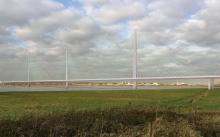Major road projects in Scotland will improve the country’s transport connections. Plans are now in hand to fast-track the project to convert the A9 to dual carriageway status along its entire length. The road is a major transport artery to the north of Scotland, connecting the Central Belt in the south with the northern city of Inverness, providing the main gateway to the north of the country. The plans call for the upgrading of the A9 to dual carriageway status between Perth and Inverness. Work on the 5km
RSSMajor road projects in Scotland will improve the country’s transport connections. Plans are now in hand to fast-track the project to convert the A9 to dual carriageway status along its entire length. The road is a major transport artery to the north of Scotland, connecting the Central Belt in the south with the northern city of Inverness, providing the main gateway to the north of the country. The plans call for the upgrading of the A9 to dual carriageway status between Perth and Inverness. Work on the 5km section between Kincraig and Dalreddy will commence in 2015-2016. All 128km should be converted to dual carriageway by 2025, at a total cost of €3.8 billion (£3 billion). Within the next 12 months, consultants will be appointed to oversee the scheme, which has been required for some time. The A9 carries high volumes of tourist traffic with a high percentage of overseas drivers and the route is notorious for head-on collisions, many of which involve non-British drivers. In winter, the A9 can be particularly treacherous and the section between Perth and Inverness is frequently closed due to heavy snowfalls. Upgrading this section of the route to dual carriageway status should help improve both traffic flow and safety.
Meanwhile a shortlist of four consortia is bidding for key road projects in Scotland’s Central Belt. The €525.4 million (£415 million) improvement programme will cover widening sections of the M8, M73, M74 that currently experience severe congestion at peak periods. The consortia approved to bid for the work are: Scotia Roads Group; Scottish Roads Partnership; Caledonia Roads Group; Connect Roads and the firms involved in these consortia include many major UK and overseas contractors. Scotia Roads Group comprises: Costain, Iridium, Sir Robert McAlpine Capital Ventures and BAM/PGGM; while Scottish Roads Partnership is made up of Amey, Cintra, Meridiam Infrastructure Finance and Uberior Infrastructure Investments. Caledonia Roads Group comprises; Macquarie, Vialia Sociedad Gestora, FCC Construccion, John Graham Holdings and John Sisk & Son; while Connect Roads comprises Balfour Beatty and Galliford Try.
Meanwhile a shortlist of four consortia is bidding for key road projects in Scotland’s Central Belt. The €525.4 million (£415 million) improvement programme will cover widening sections of the M8, M73, M74 that currently experience severe congestion at peak periods. The consortia approved to bid for the work are: Scotia Roads Group; Scottish Roads Partnership; Caledonia Roads Group; Connect Roads and the firms involved in these consortia include many major UK and overseas contractors. Scotia Roads Group comprises: Costain, Iridium, Sir Robert McAlpine Capital Ventures and BAM/PGGM; while Scottish Roads Partnership is made up of Amey, Cintra, Meridiam Infrastructure Finance and Uberior Infrastructure Investments. Caledonia Roads Group comprises; Macquarie, Vialia Sociedad Gestora, FCC Construccion, John Graham Holdings and John Sisk & Son; while Connect Roads comprises Balfour Beatty and Galliford Try.







